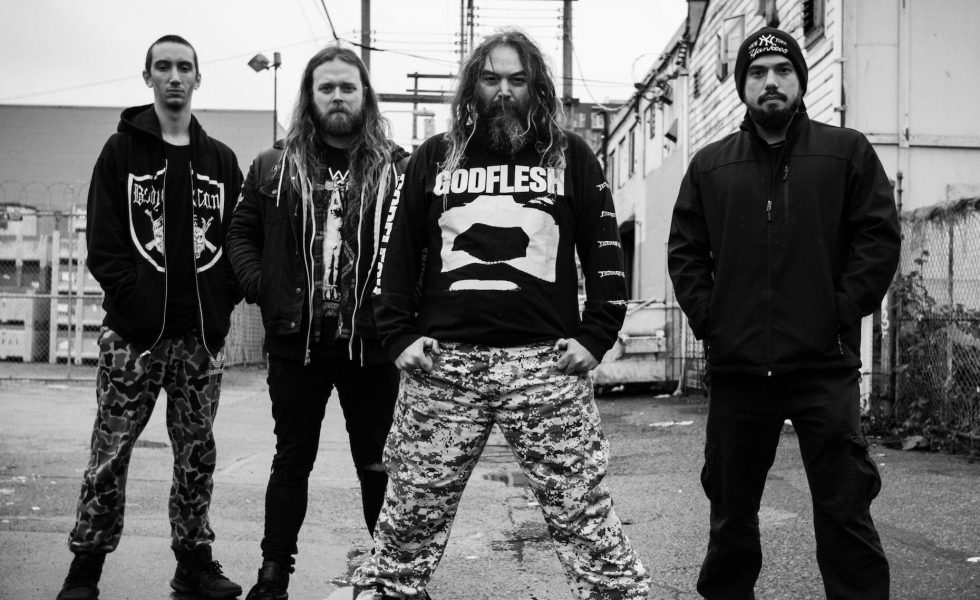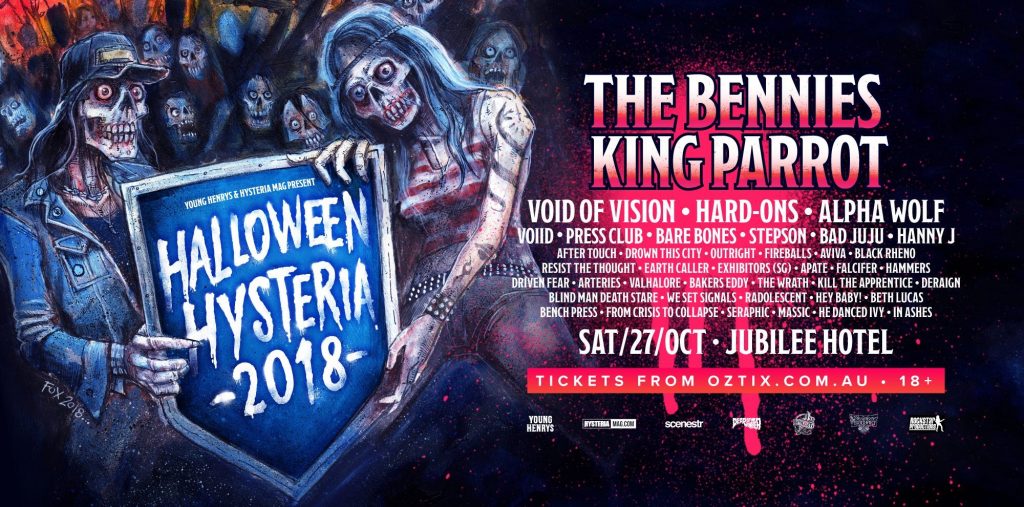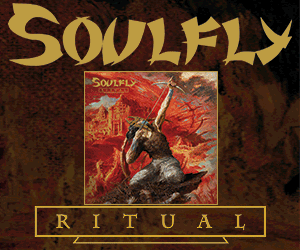As Flaming Wrekage’s brutal fourth album tickles your earholes, you know this is something special. …
Arizona-based thrash-groove metal warriors Soulfly are set to release their eleventh album, Ritual. Though born of the ashes of vocalist and guitarist Max Cavalera’s departure from Sepultura just over 20 years ago, Soulfly has grown into a tribal metal phenomenon that embodies Cavalera’s musical vision. Now with Ritual, Soulfly has produced its strongest album to date.
Ritual heralds the return of the tribal influences in Soulfly’s sound, but it also has a strong shot of themes like oppression and exploitation that resonate with Soulfly’s earlier works. What has triggered this revival? “I like to think that, I feel very… almost like it’s a necessity,” Cavalera insists, “to speak about these kind of things in this day and age because we are in a such a terrible mess in the world right now, people are more oppressed than ever… and I needed to say these things, we are not a political band, but I am a bit of a political person … so I felt like this time round the record went back to a bit of the tribal groove elements mixed with death metal and thrash metal.
“Lyrically there was a lot I wanted to say, the Navajo story in Blood On The Street, about the Navajo girl who was murdered on the street by the police, nothing happened, most of the Native American cases get thrown away, they don’t even look at them, like they are sub-humans…these are the real oppressed people here and I feel like I am the champion of the oppressed people, I gotta say something, I have to fight for them, I mean, because I don’t see anybody else doing it. So that’s the reason those songs came out on the record and feel it was kind of a necessity to have this kind of songs on the album, because of the times we are living in right now.”
Ritual features some very haunting and resonant Navajo chants and music, such as the album opening on the title track. Describing how these were sourced, Cavalera says, “I recorded them myself, its all do-it-yourself, really low quality recording actually, I had a ten dollar microphone from RadioShack and my four-track machine and I got in my car and I drove to Navajo tribal land, met with them and came to a hotel room, I sat in the middle and recorded, like Burzum style,” he laughs, “black metal style,” laughs some more, “really cool, real lo-fi. I gathered my recordings and sent them to Josh [Wilbur, producer], and the magic is up to him to put them on the songs. I dunno, when he put them on the first song, Ritual, I kind of like almost freaked out, because the key of the chanting is identical to the guitar key, and how the hell does that happen … but its blends. Again its one of those music magic moments that I don’t even want to understand. At this point, the less I understand, the better, I think, because I don’t want explanations, I think it’d blow my mind. But yeah, it’s all field recordings. I could have got that from Youtube, just find some tribal chant and put it on the record, but where’s the fun in that? You gotta go record it yourself, like a field recorder, you know, like National Geographic shit. But punk rock National Geographic, you know, without the big budget.”
I could have got that [chant] from YouTube, just find some tribal chant and put it on the record, but where’s the fun in that? You gotta go record it yourself, like a field recorder, you know, like National Geographic shit. But punk rock National Geographic, you know, without the big budget.
[MAX]
Ritual contains many references to spirituality. Cavalera is undoubtedly eager to explore these themes. “Yeah I mean I am a spiritual person,” he begins, “not necessarily a religious person, but very much spiritual, which I think is a bit different, and I like to think about things that I cannot like…the song Under Rapture is a perfect example, its about embracing your spirituality especially in the moment of your death, which the song deals with, you know, right when you see the light, in the moment… I think those seconds right before you die would have to be earth shattering for each person, you know, you realise you’re dying and realise something’s going to happen, an afterlife, because I believe in that too, and that crosses more into the lyrics of Ritual when I had stuff like ‘when you think it’s the end, your pilgrimage begins’, that is about life and death also.
“You know, I’m a big kind of believer to respect a lot of religions, I just disagree with a lot of religions, so its kind of like a love-hate relationship that I have with religion, but I am very spiritual and I do believe in something guiding us, or helping us, through life and you have to have this kind of beliefs, and on the album I talk about that, I think The Summoning has a bit of that, but more about the [Navajo] tribal people, because The Summoning is about the exploitation of the tribes by white people, and how they raped them and gave them ‘god’ and took all the gold, and gave them a god that they didn’t want, they already had their own gods and they forced them to have this new god now, this was the new law, this is your new god, you know, he laughs. “Absurd. But it’s the spirituality of the Indians, that’s why it [The Summoning] says like… there’s words like …’I fear no one, into the storm I run’, those are real passages from the Indian beliefs…so there’s a lot of cool stuff on the record like that, you know. It wasn’t really fun to execute it though, the producer [Wilbur] was very narrow and insistent that I had to sing what I believe and believe in what I sing, so this kind of drove me a bit crazy, I was very frustrated a lot of times, I would sing, and he would be not convinced and I would go outside the studio and take some air, come back to do it all over again. But that’s the sign of a good producer, that’s someone really pushing you to a good performance.
“I think we did it, through the persuasion, the vocals came out good, the lyrics came out good, and I think people will believe them, when I talk about what I’m talking about on the record, which I think is really cool because its all really cool topics that are about life today in general, and we want to be a different kind of band with a different kind of message, you know, we’re not singing about demons, we’re not singing about dragons, we’re singing about real life issues so it’s important make sure they’re done right. It was a bit frustrating but I think we did get it right.”
The producer [Wilbur] was very narrow and insistent that I had to sing what I believe and believe in what I sing, so this kind of drove me a bit crazy, I was very frustrated a lot of times, I would sing, and he would be not convinced and I would go outside the studio and take some air, come back to do it all over again. But that’s the sign of a good producer, that’s someone really pushing you to a good performance.
[MAX]
Speaking of spirituality, the album cover art depicts a warrior shooting at the sky, which Cavalera explains, “It’s very symbolic, I think. The image is taken from my mother’s religion, Candomblé, is actually a warrior, who is a transfiguration of St Michael from the Catholic world, and he’s a protector in Brazil of the forest people, or the tribal people, and shooting at the sky is almost like shooting at God, a bit symbolic, like, don’t fuck with us [laughs] not even God can fuck with us. I like that Eliran [Kantor, artist for the album cover], captured the essence of the spirit of the warrior, he’s not from any particular tribe…he’s kind of from everywhere, a universal tribal warrior and he has the Soulfly mask, so he’s one of us, he’s got the Babylon ruins behind him, which is really cool, as I love all the Babylonian themes, and there’s like this crazy dinosaur head at the side of the warrior and I love the colours, the beautiful red and yellow and orange, I think it’s a cool cover, I think it goes well. The name ‘Ritual’…you could have done a million covers that would have looked cool…its really open, it’s a really fucking open title, but we decided to go with tribal, because this record has that influence, the Navajo influence, recording with the Navajos, its was big on the tribal front, I felt that we needed a tribal guy [on the cover] and we got one. He [Kantor] is a really amazing artist.”
The closing track on Ritual continues the Soulfly tradition of an emotionally inspired instrumental. What lead to the use of saxophones in Soulfly XI? “I love these ‘Soulfly’ tracks” Cavalera says “they were born out of accident, on the first record, and I wrote on the album liners ‘we close our eyes and play from the heart to the loved ones who are no longer here with us in flesh but are always with us in spirit.’ We went into the jamming and ended up making a song on each Soulfly record has an instrumental and my task was to make them different and as interesting as possible, and I never had a saxophone on anything for Soulfly, never even knew anybody who played saxophone, and I thought it would be great on this track, really mellow jazzy saxophone to go with the music, because the music was already there, all the riffs from more than twenty years ago that I’d savoured and never used, and Josh loved it and we just used the original ones. I think its cool to end the record like that, because we have all this heaviness, all this brutality, this grooves…and it’s the calm after the storm.” //
Ritual is due for release 19 October 2018 via Nuclear Blast.






